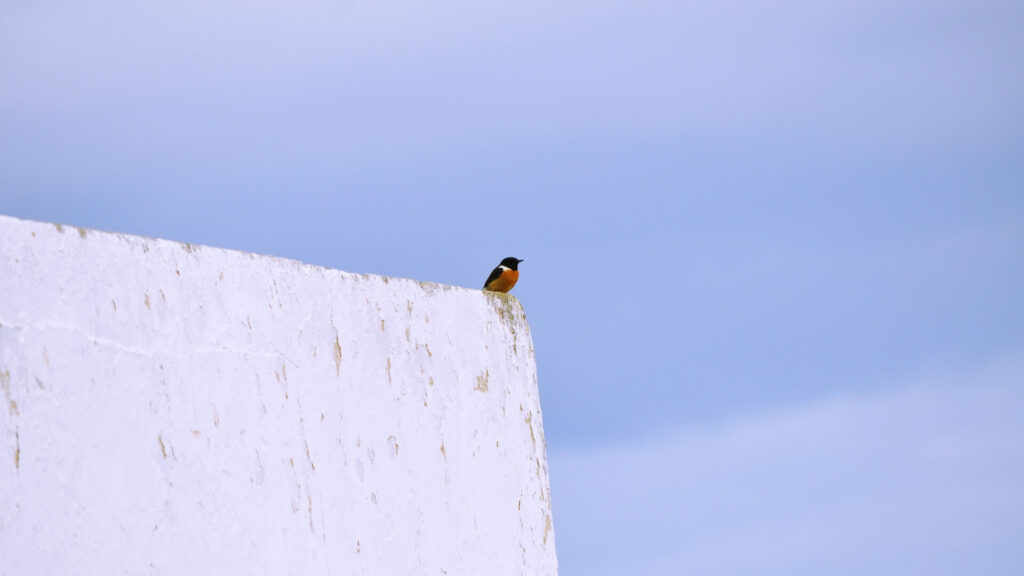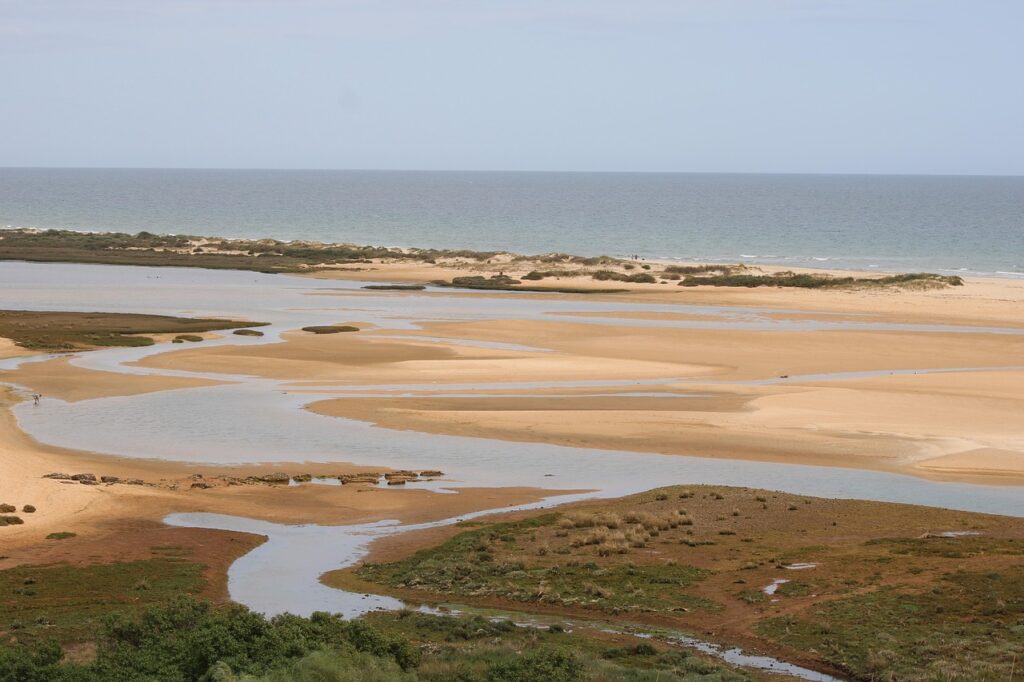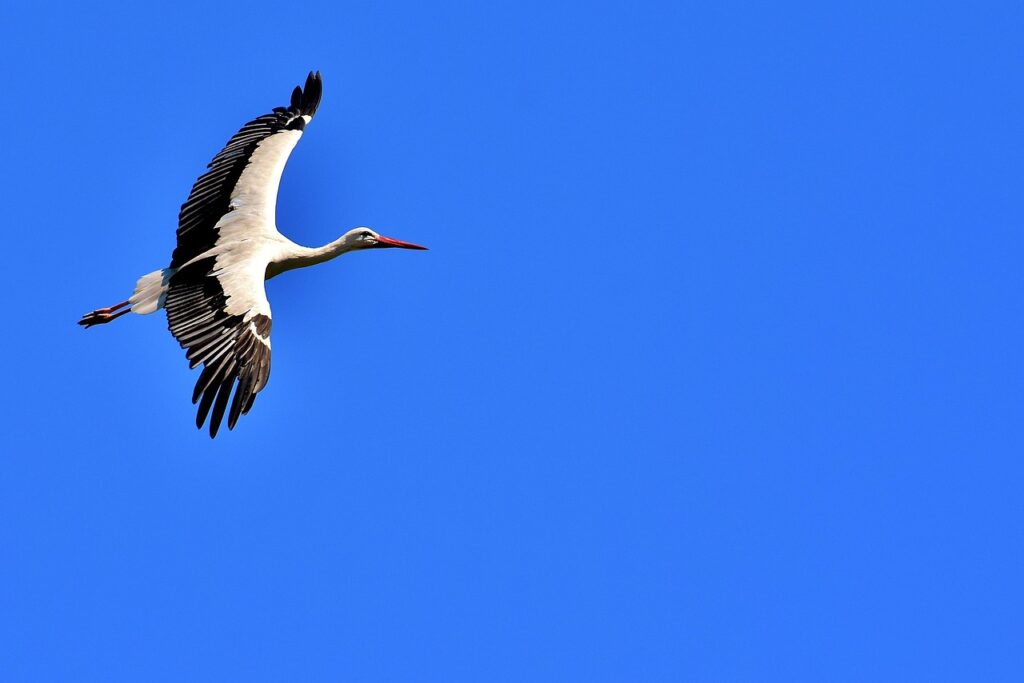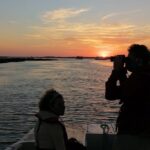Winter settles gently over the Algarve. The light softens, the air cools, and the clamour of summer fades to a murmur. Out on the Ria Formosa, this change of season transforms the landscape. The lagoon takes on a calmer rhythm; the tides move slowly through salt-pans and creeks, and the cries of birds carry clearly across the still water.
For those who love nature, winter is a time of revelation. Away from the crowds, the Ria Formosa Natural Park becomes something intimate and serene. With the cooler days, every lap of water and echo of birdcall feels magnified. It’s also the season when birdlife flourishes. Thousands of migratory species arrive from northern Europe to rest and feed, turning the lagoon into one of Portugal’s most rewarding winter birdwatching destinations.
Keep reading to find out why we love the Ria Formosa in winter. And if you’d like to join us for an eco-friendly tour, explore our Private Boat Trips from Faro.

Why Winter Works for Visits to the Ria Formosa
Many travellers think of the Algarve as a summer escape, yet the region’s mild winters are one of its best-kept secrets. Average daytime temperatures hover around 16–18°C, and rain is light. These gentle conditions make it ideal for being outdoors without the heat or glare of high season.
Winter also brings a profound quiet. The summer traffic of boats, beachgoers, and day-trippers gives way to empty channels and open skies. This stillness allows wildlife to behave naturally, undisturbed by noise. Flocks of waders feed in the exposed mudflats, ducks and grebes cluster on the lagoons, and the sound of flamingos echoes faintly across the water.
The park itself feels different, too. The golden reeds turn pale, the air carries a hint of salt and pine, and light pools low across the horizon. For photographers and naturalists, the cooler days provide optimal conditions.
Birdlife Highlights of the Season
Over 200 bird species can be observed in Ria Formosa throughout the year, but winter brings an extraordinary variety. The tidal flats and saltpans attract large numbers of waterfowl: Eurasian Wigeon, Northern Pintail, Shoveler, and Gadwall are common sights. Greater Flamingos feed gracefully in the shallows, while Avocets, Black-winged Stilts, and Spoonbills sweep the mud for food.
In sheltered areas, Little Egrets, Glossy Ibises, and Grey Herons stalk quietly through the reeds. Offshore, Sandwich Terns dive for fish, and on still mornings, Black-necked Grebes dot the water like tiny mirrors. Every channel or sandbar offers a surprise: perhaps a Marsh Harrier circling low, or a flock of Dunlins flashing in unison across the sky.
The great gift of winter birdwatching is the time it allows. Without the rush of summer visitors, you can linger. Watching birds feed and interact in their natural rhythm becomes an absorbing experience. And with fewer distractions, the lagoon’s quiet details reveal themselves.
For a birdwatching experience like no other, consider booking a place on our Faro Birdwatching Boat Trip.

A Landscape Perfect for Observation
One reason Ria Formosa is so remarkable is the sheer diversity of habitats packed into a small area. Within a few kilometres, you move from mudflats to lagoons, from dunes to saltmarsh. Each zone supports its own life: crustaceans in the sand, waders along the tide line, egrets and herons among the reeds.
For birdwatchers, this mosaic is a dream. It means every moment brings a change of scene and species. And because the park lies directly beside Faro, it’s easily reached; it’s ideal for half-day excursions or unhurried mornings spent outdoors.
Winter intensifies the sense of peace. The usual hum of summer engines is replaced by the faint rustle of wings or the distant call of curlews. It’s this natural soundtrack that makes Ria Formosa so memorable in the cooler months.
Planning Your Winter Visit to the Ria Formosa
Early morning is the prime time for birdwatching. The first light catches the water, and flocks begin to move between feeding grounds. Later in the day, the air warms and the lagoon settles into a reflective calm.
A few simple preparations help make the most of the experience: layered clothing, sun protection, and binoculars are essentials. Bring a camera if you can — winter’s low-angled light produces soft, golden tones perfect for photography.
The Algarve’s weather is famously kind, yet breezes can pick up near the water, so a light jacket is always useful. And because winter days are shorter, planning a half-day outing is ideal. It leaves time for a warm lunch in Faro and perhaps another visit the next morning.
Why Choose a Private Birdwatching Tour
Winter is the perfect moment to enjoy Ria Formosa at your own pace. With a Private Ria Formosa Birdwatching Tour, you can tailor the day entirely to your preferences. Choose your departure time, adjust the route depending on the tides, and linger where the birdlife is most active.
The quiet hum of a solar-powered boat enhances the experience. Moving silently through the water allows you to get closer to the birds without disturbing them. There’s no engine noise, no fumes, just the natural sounds of the lagoon. For photographers, this silence is invaluable; for families or small groups, it creates a shared sense of calm.
Each tour is guided by a knowledgeable naturalist who understands how the seasons shape the park. They know where flamingos gather, when spoonbills are most active, and how light and tide affect visibility.

A Season for Stillness
Winter reveals a side of Ria Formosa that summer never quite can. The landscape is quieter, the colours softer, and the birdlife at its peak. It’s a time when nature feels close enough to touch.
For birdwatchers, photographers, or anyone seeking peace in nature, the cooler months bring unmatched rewards. Fewer people, better light, abundant wildlife, and the chance to experience it all in silence aboard a solar-powered boat.
Those who visit in winter often say it feels as if the park belongs to them alone. That’s the magic of Ria Formosa at this time of year: its beauty is not just seen, but felt in the stillness of the air and the slow rhythm of the tides.
Plan your private winter birdwatching tour with Lands.pt and discover why the quieter months might just be the Algarve’s most extraordinary season.



